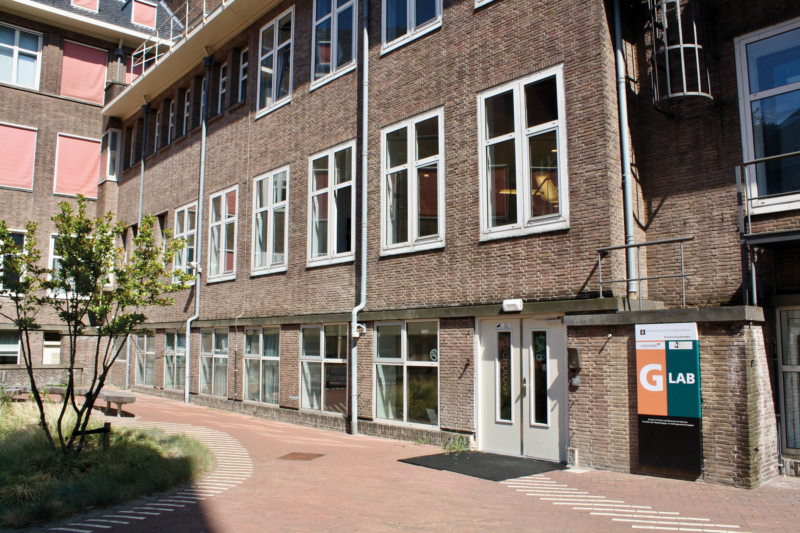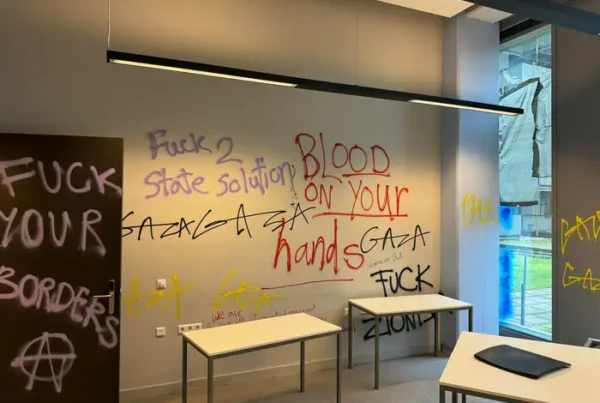

According to a recent article published by Folia, Internationale studenten zwaar oververtegenwoordigd in studentenraden (International students are heavily over-represented in student councils), there are a disproportionate number of international students and Dutch students in several student councils. This is especially true for the Student Council of the Economics and Business faculty, which has no Dutch students at all. For the Central Student Council and the Social and Behavioural Sciences council, international students occupy close to 60% of the spots while comprising only 20-30% of the student population. This phenomenon of increasing international presence on councils is happening across the Netherlands, only at UvA it appears to be occurring more rapidly.
As editors-in-chief at Spiegeloog, this brought our attention to the dwindling number of Dutch editors on our board. While roughly 50% of our psychology students are Dutch, only about 20% of our board is Dutch. After some thought, we decided to weigh in on the discussion by giving an ‘international’ and Dutch perspective, respectively.
Lydia
To this discussion, I add two points. Firstly, while I believe a fully non-Dutch or fully Dutch council would be detrimental, I do not think a council with ‘proportionate’ representation is ideal either. While some of the non-local perspectives would be heard and considered, it would be near impossible for change to be affected by this ‘minority group’ in faculties and at UvA as a whole. Furthermore, the problems faced by a student from Malaysia, for example, is likely to be vastly different than that of a student from Canada, although both are considered ‘internationals.’ I think having a good spread of nationalities and cultures is what we should aim for, something akin to having global representation – for instance, having some students from different parts of Europe, some from different parts of Asia, etcetera.
This leads to my second point that ‘internationals’ shouldn’t be lumped together in a manner commonly practiced by the communities in UvA, as reflected in the article published by Folia. Students that fall under the category of ‘internationals’ come from different places and cultures, having different experiences. It would be too simplistic (and perhaps even bordering on xenophobic) to classify the students at UvA as international versus Dutch. It obscures and glosses over the great diversity within the international community as well as possibly contributing to an in-group out-group mentality. Furthermore, this labeling of international students and Dutch students may contribute to a divide that can be counterintuitive to our university’s goal of inclusivity and diversity.
By aiming for a more holistic representation, a variety of perspectives can be introduced into councils and other student groups, to create a more inclusive university culture. Furthermore, perhaps the undertones of the discussions within these groups may become less of a ‘Dutch versus International interest’ and more of a ‘What is best for the students attending our university?.’ I believe that this would be more in line with the goal of the council and other interest groups, to cultivate an enjoyable university culture and experience for all its students.
The counterbalancing-article to this, Internationals lopen in studentenraden tegen taalbarrière aan (Internationals run into language barriers in student councils), discussed the issues faced when documents are not translated for the English-speaking members of the council. One thing that struck me was the last point on learning Dutch. In the article, it stated that all non-Dutch students are invited to learn Dutch when they register.
However, it failed to mention the price attached to this invitation which can act as a deterrent on top of the extra time and effort required, as non-EEA students already pay higher university fees (8 to 10 thousand euros a year). Taking courses to master at least a B2 level (‘university-level’ Dutch) would cost around 2500 euros at the very least – with each course costing around 300-500 euros. Furthermore, most of the students from abroad are not native English-speakers and have picked up English as a second or third language. Since UvA has positioned itself as a bilingual and international university, any effort made to learn Dutch beyond simple conversational skills is going beyond what these students signed up for.
That said, as a bilingual and international university that values diversity, our community needs to go beyond being an international university on paper. If some basic courses are not offered for free – which some Dutch universities have done – then they should continue to make structural changes that reflect their intentions to embrace diversity, such as translating all relevant Dutch texts to English so that non-Dutch speaking students can engage in meaningful discussions and carry out their roles well.
Julius
Finding the perfect, democratic system is an almost impossible goal that many people throughout history have struggled with – and still are. Even when a good political system is found, adequate and representative participation is needed for it to function well. I think this is where the problem with representation on the student councils might lie. International students might be more motivated to participate and vote than Dutch students, leading to over-and under-representation of the respective groups.
It did not surprise me to read that Dutch students are often underrepresented in student councils at UvA – and I think the same can be found for other extracurricular instances as well (our editorial board, for instance, consists of about 80% of international students). In my experience, the average international student seems to work harder and show more commitment than the average Dutch student. Looking from a psychological viewpoint, I believe this can be largely attributed to motivation. For students to actively participate in student councils or other influential instances (both voting or representing), motivation is required. Now, this motivation to participate could be a lot higher for the international students compared to the Dutch students because of the different commitments the students made to studying at UvA.
International students have committed a lot more resources to study at the UvA. They moved from a different country to study here in Amsterdam, leaving behind family and friends and changing their lives completely, diving into an unknown country with different values and norms. This is paired with high (compared to what Dutch students pay) tuition fees and the generally high costs of living in expensive Amsterdam. All in all, quite an investment if you compare it to Dutch students studying at UvA. Dutch students often already have a social network in Amsterdam, and they are familiar with the city and culture. Additionally, they can often keep living at their parents’ home, not paying any rent and using public transport for free. Finally, their tuition fees are substantially lower. You could say they are in a more comfortable position than international students, both in terms of finances and in terms of familiarity.
I think that these differences might be able to explain why international students are more motivated to participate in student councils, compared to Dutch students. As mentioned, international students have made a larger commitment/investment than Dutch students. Therefore, to justify their big decision, they are probably more motivated to make the best of it. Since, if it turned out to be a bad decision, it would be a costly mistake (or loss) which would feel very unpleasant. This seems to be in line with prospect theory (Kahneman & Tversky, 1979). Such a loss will therefore often be prevented or compensated for, by ensuring the commitment is worth it.
Participating in all sorts of extracurricular activities and instances, like student councils, has several benefits. It leads to meeting more friends and can improve both CVs and the quality of education. All of this helps to justify – and gives returns – for the investment that internationals have made when deciding to study at UvA. For Dutch students, this motivation may be less present, since they didn’t commit as many resources to their studies. If it turned out to be a wrong decision, they also lose money and time, which would be unpleasant, but it’s not as bad compared to students from abroad. Dutch students might therefore not be as motivated to make the best of their time at UvA and participate less in extracurricular groups and activities, such as student councils.
I think the discussion about under- and overrepresentation in student councils might currently be aimed at the wrong points. We shouldn’t argue about whether an equal representation is desired or not – of course, it is desired. Student councils should adequately represent the views of their student population. To attain a better representation, the debate might instead focus on how to improve student participation. In the 2020 student council elections, only a meager 15% of students voted (student.uva.nl). With such a low turn-out, it is not very surprising that the councils might not represent their student population adequately. So, the solution might be simple. If more students are motivated to vote and participate (especially Dutch students), the representation will be more proportionate, which might result in a better political system.
References
-Kahneman, D. & Tversky, A. (1979). Prospect Theory: An Analysis of Decision under Risk. Econometrica. 47(4), 263–291.
-Student.uva.nl. (July 8, 2020) Uitslagen bekend Studentenraadsverkiezingen 2020. Retrieved from https://student.uva.nl/content/nieuws/2020/07/uitslag-bekend-studentenraadsverkiezingen.html?origin=faY8H5a7SrascT0dFXFohg

According to a recent article published by Folia, Internationale studenten zwaar oververtegenwoordigd in studentenraden (International students are heavily over-represented in student councils), there are a disproportionate number of international students and Dutch students in several student councils. This is especially true for the Student Council of the Economics and Business faculty, which has no Dutch students at all. For the Central Student Council and the Social and Behavioural Sciences council, international students occupy close to 60% of the spots while comprising only 20-30% of the student population. This phenomenon of increasing international presence on councils is happening across the Netherlands, only at UvA it appears to be occurring more rapidly.
As editors-in-chief at Spiegeloog, this brought our attention to the dwindling number of Dutch editors on our board. While roughly 50% of our psychology students are Dutch, only about 20% of our board is Dutch. After some thought, we decided to weigh in on the discussion by giving an ‘international’ and Dutch perspective, respectively.
Lydia
To this discussion, I add two points. Firstly, while I believe a fully non-Dutch or fully Dutch council would be detrimental, I do not think a council with ‘proportionate’ representation is ideal either. While some of the non-local perspectives would be heard and considered, it would be near impossible for change to be affected by this ‘minority group’ in faculties and at UvA as a whole. Furthermore, the problems faced by a student from Malaysia, for example, is likely to be vastly different than that of a student from Canada, although both are considered ‘internationals.’ I think having a good spread of nationalities and cultures is what we should aim for, something akin to having global representation – for instance, having some students from different parts of Europe, some from different parts of Asia, etcetera.
This leads to my second point that ‘internationals’ shouldn’t be lumped together in a manner commonly practiced by the communities in UvA, as reflected in the article published by Folia. Students that fall under the category of ‘internationals’ come from different places and cultures, having different experiences. It would be too simplistic (and perhaps even bordering on xenophobic) to classify the students at UvA as international versus Dutch. It obscures and glosses over the great diversity within the international community as well as possibly contributing to an in-group out-group mentality. Furthermore, this labeling of international students and Dutch students may contribute to a divide that can be counterintuitive to our university’s goal of inclusivity and diversity.
By aiming for a more holistic representation, a variety of perspectives can be introduced into councils and other student groups, to create a more inclusive university culture. Furthermore, perhaps the undertones of the discussions within these groups may become less of a ‘Dutch versus International interest’ and more of a ‘What is best for the students attending our university?.’ I believe that this would be more in line with the goal of the council and other interest groups, to cultivate an enjoyable university culture and experience for all its students.
The counterbalancing-article to this, Internationals lopen in studentenraden tegen taalbarrière aan (Internationals run into language barriers in student councils), discussed the issues faced when documents are not translated for the English-speaking members of the council. One thing that struck me was the last point on learning Dutch. In the article, it stated that all non-Dutch students are invited to learn Dutch when they register.
However, it failed to mention the price attached to this invitation which can act as a deterrent on top of the extra time and effort required, as non-EEA students already pay higher university fees (8 to 10 thousand euros a year). Taking courses to master at least a B2 level (‘university-level’ Dutch) would cost around 2500 euros at the very least – with each course costing around 300-500 euros. Furthermore, most of the students from abroad are not native English-speakers and have picked up English as a second or third language. Since UvA has positioned itself as a bilingual and international university, any effort made to learn Dutch beyond simple conversational skills is going beyond what these students signed up for.
That said, as a bilingual and international university that values diversity, our community needs to go beyond being an international university on paper. If some basic courses are not offered for free – which some Dutch universities have done – then they should continue to make structural changes that reflect their intentions to embrace diversity, such as translating all relevant Dutch texts to English so that non-Dutch speaking students can engage in meaningful discussions and carry out their roles well.
Julius
Finding the perfect, democratic system is an almost impossible goal that many people throughout history have struggled with – and still are. Even when a good political system is found, adequate and representative participation is needed for it to function well. I think this is where the problem with representation on the student councils might lie. International students might be more motivated to participate and vote than Dutch students, leading to over-and under-representation of the respective groups.
It did not surprise me to read that Dutch students are often underrepresented in student councils at UvA – and I think the same can be found for other extracurricular instances as well (our editorial board, for instance, consists of about 80% of international students). In my experience, the average international student seems to work harder and show more commitment than the average Dutch student. Looking from a psychological viewpoint, I believe this can be largely attributed to motivation. For students to actively participate in student councils or other influential instances (both voting or representing), motivation is required. Now, this motivation to participate could be a lot higher for the international students compared to the Dutch students because of the different commitments the students made to studying at UvA.
International students have committed a lot more resources to study at the UvA. They moved from a different country to study here in Amsterdam, leaving behind family and friends and changing their lives completely, diving into an unknown country with different values and norms. This is paired with high (compared to what Dutch students pay) tuition fees and the generally high costs of living in expensive Amsterdam. All in all, quite an investment if you compare it to Dutch students studying at UvA. Dutch students often already have a social network in Amsterdam, and they are familiar with the city and culture. Additionally, they can often keep living at their parents’ home, not paying any rent and using public transport for free. Finally, their tuition fees are substantially lower. You could say they are in a more comfortable position than international students, both in terms of finances and in terms of familiarity.
I think that these differences might be able to explain why international students are more motivated to participate in student councils, compared to Dutch students. As mentioned, international students have made a larger commitment/investment than Dutch students. Therefore, to justify their big decision, they are probably more motivated to make the best of it. Since, if it turned out to be a bad decision, it would be a costly mistake (or loss) which would feel very unpleasant. This seems to be in line with prospect theory (Kahneman & Tversky, 1979). Such a loss will therefore often be prevented or compensated for, by ensuring the commitment is worth it.
Participating in all sorts of extracurricular activities and instances, like student councils, has several benefits. It leads to meeting more friends and can improve both CVs and the quality of education. All of this helps to justify – and gives returns – for the investment that internationals have made when deciding to study at UvA. For Dutch students, this motivation may be less present, since they didn’t commit as many resources to their studies. If it turned out to be a wrong decision, they also lose money and time, which would be unpleasant, but it’s not as bad compared to students from abroad. Dutch students might therefore not be as motivated to make the best of their time at UvA and participate less in extracurricular groups and activities, such as student councils.
I think the discussion about under- and overrepresentation in student councils might currently be aimed at the wrong points. We shouldn’t argue about whether an equal representation is desired or not – of course, it is desired. Student councils should adequately represent the views of their student population. To attain a better representation, the debate might instead focus on how to improve student participation. In the 2020 student council elections, only a meager 15% of students voted (student.uva.nl). With such a low turn-out, it is not very surprising that the councils might not represent their student population adequately. So, the solution might be simple. If more students are motivated to vote and participate (especially Dutch students), the representation will be more proportionate, which might result in a better political system.



